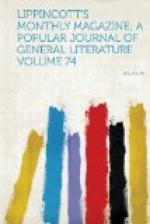A wigwam, larger and more pretentious than most of the others in Echota, stood a little apart from the rest, and not far from the council-house. Like the others, it had a frame of poles covered with tanned skins; but it was distinguished from them by a singular “totem,”—an otter in the coils of a water-snake. Its interior was furnished with a sort of rude splendor. The floor was carpeted with buffalo-hides and panther-skins, and round the walls were hung eagles’ tails, and the peltries of the fox, the wolf, the badger, the otter, and other wild animals. From a pole in the centre was suspended a small bag,—the mysterious medicine-bag of the occupant. She was a woman who to this day is held in grateful remembrance by many of the descendants of the early settlers beyond the Alleghanies. Her personal appearance is lost to tradition, but it is said to have been queenly and commanding. She was more than the queen, she was the prophetess and Beloved Woman, of the Cherokees.
At this time she is supposed to have been about thirty-five years of age. Her father was an English officer named Ward, but her mother was of the “blood royal,” a sister of the reigning half-king Atta-Culla-Culla. The records we have of her are scanty, as they are of all her people, but enough has come down to us to show that she had a kind heart and a sense of justice keen enough to recognize the rights of even her enemies. She must have possessed very strong traits of character to exercise as she did almost autocratic control over the fierce and wellnigh untamable Cherokees when she was known to sympathize with and befriend their enemies the white settlers. Not long before the time of which I am writing, she had saved the lives of two whites,—Jeremiah Jack and William Rankin,—who had come into collision with a party of Cherokees; and subsequently she performed many similar services to the frontier people.
Other wigwams as imposing as that of Nancy Ward, and not far from the council-house, were the habitations of the head-king Oconostota, the half-king Atta-Culla-Culla, and the prince of Echota, Savanuca, otherwise called the Raven. Of these men it will be necessary to say more hereafter: here I need only remark that they have now gathered in the council-house, with many of the principal warriors and head-men of the Ottari Cherokees, and that the present fate of civilization in the Southwest is hanging on their deliberations.




